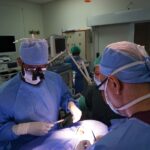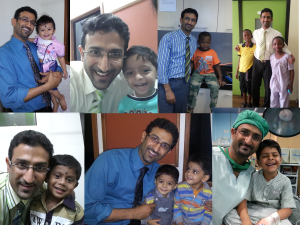For some men with hypospadias, a congenital condition where the urethral opening lies somewhere on the underside of the penis, questions about fertility can loom large. While hypospadias itself doesn’t directly impact sperm production, its associated complications can sometimes pose challenges. Hypospadias cause male infertility in certain cases due to these complications. But remember, this doesn’t mean that all men with hypospadias will necessarily be infertile. Let’s delve into the link between hypospadias and fertility, exploring potential concerns, available solutions, and fostering hope for fatherhood.
Understanding Hypospadias:
During fetal development, normally the urethra forms by folding of tissues from scrotum to the base of the penis to the tip of the penis. The failure of this urethral closure leads to hypospadias. The severity of hypospadias varies, with the opening appearing anywhere from the scrotum (scrotal hypospadias) to the base of the penis (penoscrotal hypospadias) to near the tip of the penis (distal hypospadias). Besides the misplaced opening, most men with hypospadias also have a downward bending of the penis during erection – called chordee. Hypospadias can cause male infertility as 5% of cases may also have an associated undescended or absent testis, which can lead to lower sperm production. Such men need to be investigated for a disorder of sex development (DSD) or intersex.
Hypospadias and Fertility: the Possible Connections:
In isolated hypospadias with both normal testes, the sperm production usually remains unaffected, yet certain hypospadias-related factors can influence fertility:
Urethral location: In severe unrepaired hypospadias cases such as scrotal or perineal or penoscrotal hypospadias, ejaculation might not be able to reach the vaginal introitus, hindering fertilization.
Penile curvature: Significant curvature can make intercourse physically difficult. Sometimes erection can also be painful when there is significant chordee
Meatal stenosis: abnormal hypospadias opening may be very small leading to urinary and sperm flow obstruction.
Prostatic utricular diverticulum: Some men with severe hypospadias may also have a large sac near their prostate gland where sperm tubes (vas deferens) open. In such cases sperms may not flow out easily for fertilisation.
Post hypospadias surgery issues: At Hypospadias foundation, we see lot of men who have had repairs done earlier and have poor fertility though they have a normal sperm production. The common reasons for this are complications of hypospadias surgery such as: residual curvature or chordee, stricture in new passage, diverticulum or baggy new urethra or fistulae in the urethra.
Psychological considerations: Emotional concerns about body image or sexual function can sometimes affect intimacy and overall fertility.
Hypospadias Treatment Options: Paving the Way for having children
Fortunately, advancements in hypospadias surgery and infertility treatment offer effective solutions for addressing hypospadias-related fertility concerns:
Hypospadias repair surgery: This procedure reconstructs the urethra and corrects penile curvature, often restoring normal ejaculation and improving sexual function. If there are complications from previous hypospadias surgeries such as stricture, residual chordee, fistula or a diverticulum- these can be repaired by an expert hypospadias surgeon leading to cure for infertility.
Assisted reproductive technologies (ART): In cases where natural conception proves challenging, sperm retrieval techniques like testicular biopsy or micro epididymal sperm aspiration (MESA) can be combined with IUI, IVF, or ICSI to achieve pregnancy.
Maintaining Hope: Fatherhood is Within Reach for people with Hypospadias:
Do consult an expert and best hypospadias surgeon first. The hypospadias surgeon will check and confirm that the hypospadias repair is proper and there is no structural issue in repair. If there is some residual issue in hypospadias surgery, then that needs to be corrected first. If the infertility persists, and you suspect hypospadias cause male infertility, then you must visit an andrologist for assisted reproductive techniques.
It’s crucial to remember:
The majority of men with hypospadias have normal fertility.
Early surgical intervention significantly improves the chances of successful fatherhood.
Advanced treatments like ART offer alternative paths to parenthood. Open communication with your hypospadias doctor is key to understanding your unique
situation and exploring suitable fertility options. Remember, hypospadias does not define your potential as a father. With proper support and available treatments, you can navigate this journey and realize your dreams of having babies and building a family. At Hypospadias foundation, we treat hundreds of children and adults with hypospadias every year. Since 2008, Dr A.K.Singal, rated as the best pediatric urologist and hypospadias surgeon in India and the world, has devoted his life to helping people with hypospadias get best results and normal life. Along with Dr Ashwitha Shenoy, pediatric surgeon and hypospadias surgeon and a partner at Hypospadias foundation, the team at Hypospadias foundation, has deep expertise in diagnosing and treating complex hypospadias.
References:
American Urological
Association: https://university.auanet.org/core/pediatric/hypospadias/index.cfm
National Institutes of Health: https://www.ncbi.nlm.nih.gov/books/NBK482122/
Mayo Clinic: https://www.mayoclinic.org/diseases-
conditions/hypospadias/diagnosis-treatment/drc-20355153
If you wish to have a teleconsult or a second opinion from Dr Singal/ Dr Shenoy, please write to us hypospadiasfoundationindia@gmail.com or fill up this contact form: https://www.hypospadiasfoundation.com/contact/




